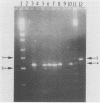Abstract
A cytotoxigenic Clostridium difficile strain that fails to produce toxin A but causes hemorrhage and bloody fluid accumulation in ligated ileal loops of rabbits and hemorrhage and diarrhea in hamsters is described. The lack of reaction of DNA from this strain in hybridization studies with a toxin A gene-specific 4.5-kb probe and polymerase chain reaction studies with six toxin A-specific primers indicate the absence of the toxin A gene. The cytotoxin produced by this strain was not responsible for the enterotoxic or hemorrhagic activity and shared characteristics with toxin B, i.e., its cytotoxicity was neutralized by antibodies to toxigenic strains of C. difficile and Clostridium sordellii. Polymerase chain reaction studies with toxin B-specific primers showed that the DNA from this strain produced a 690-bp product in addition to the expected 591-bp product.
Full text
PDF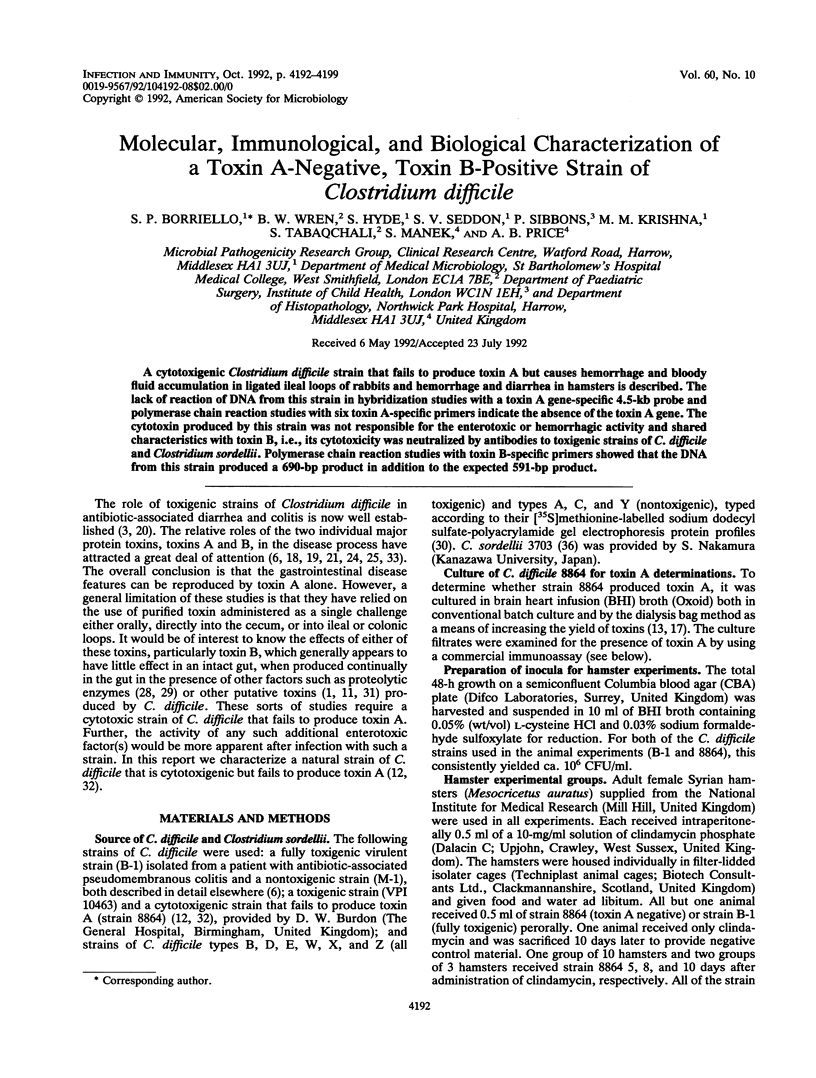
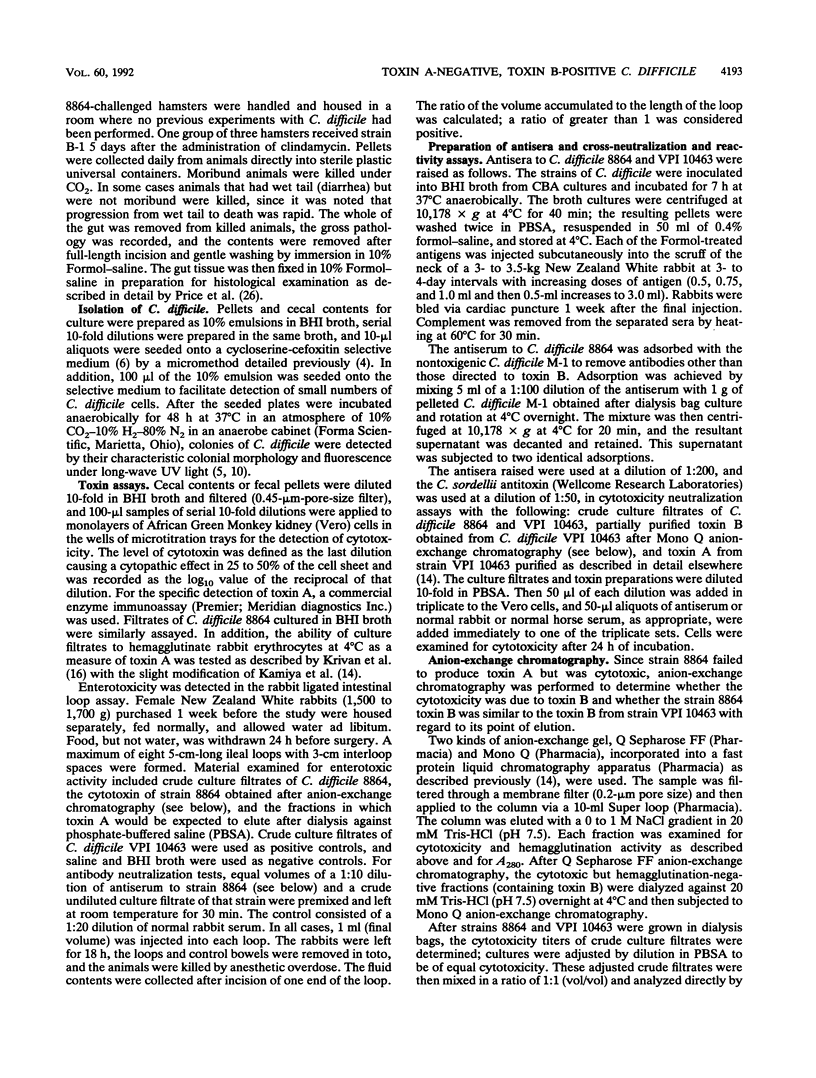
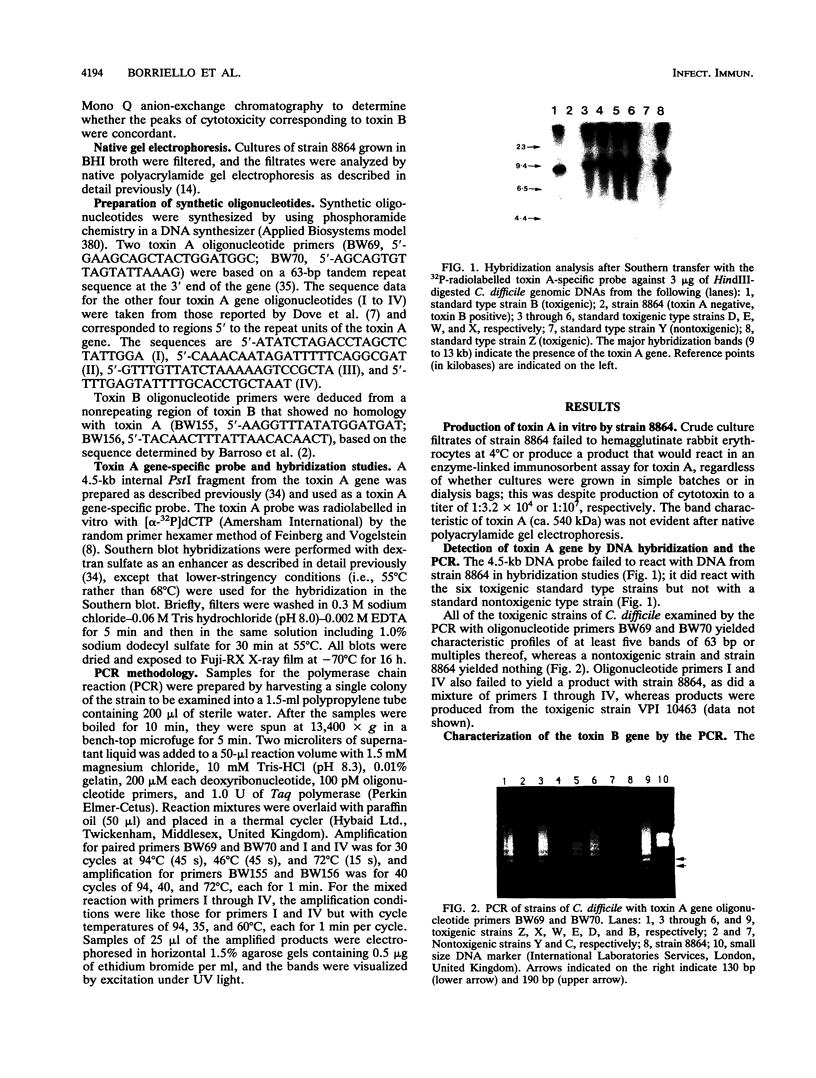
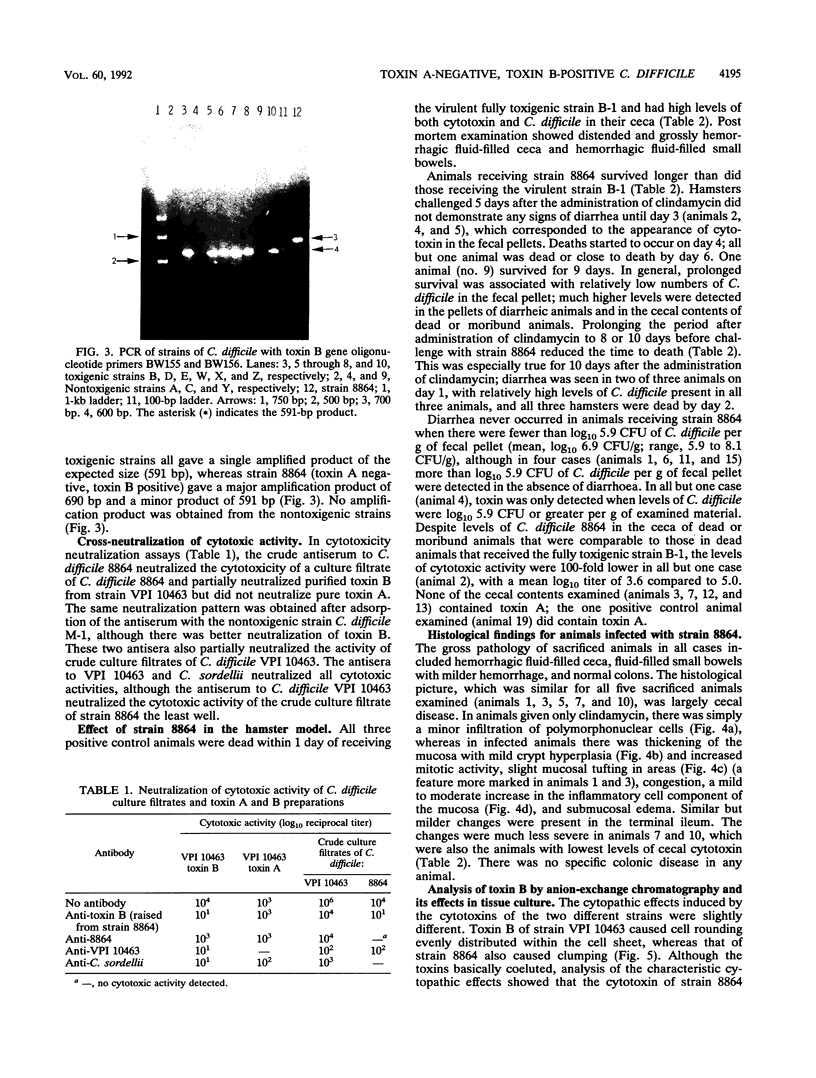
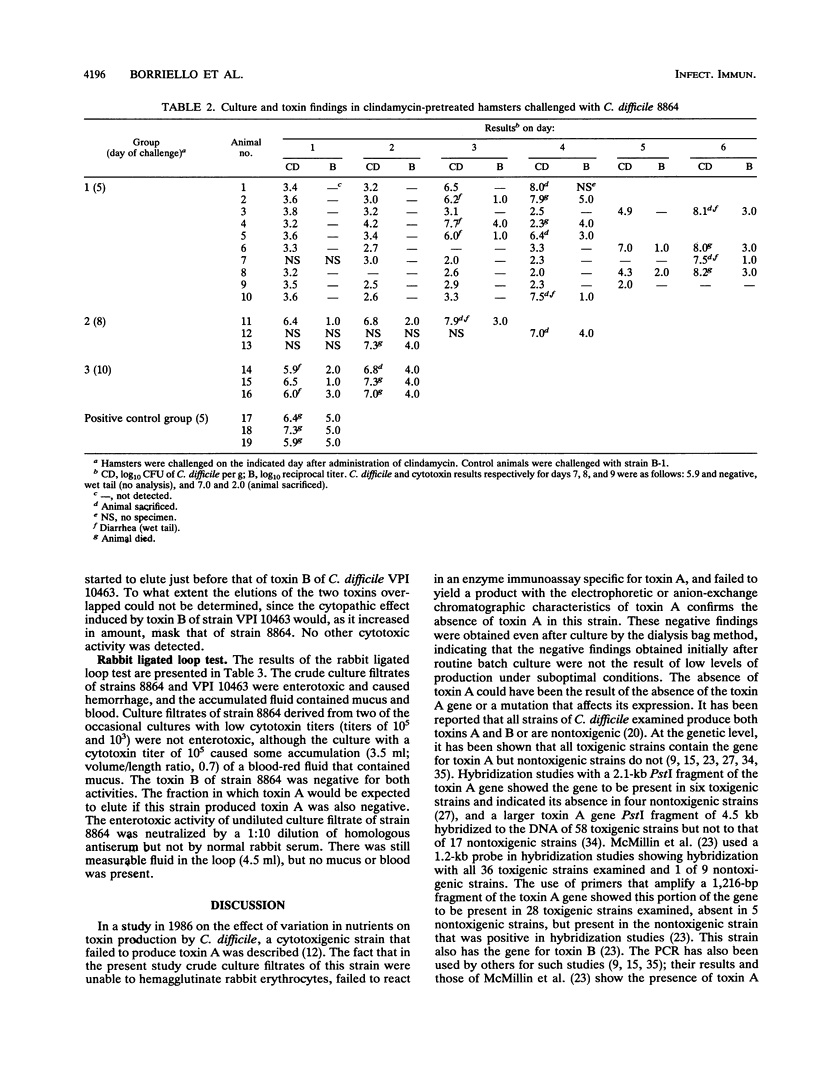
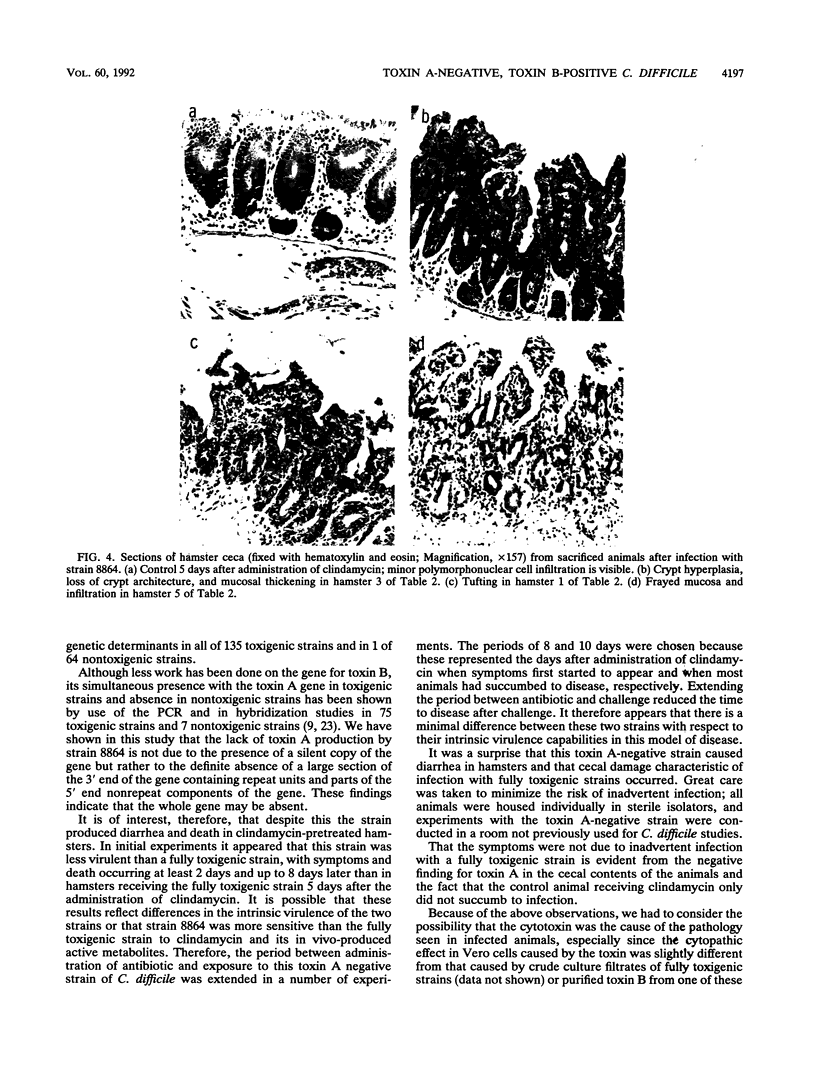
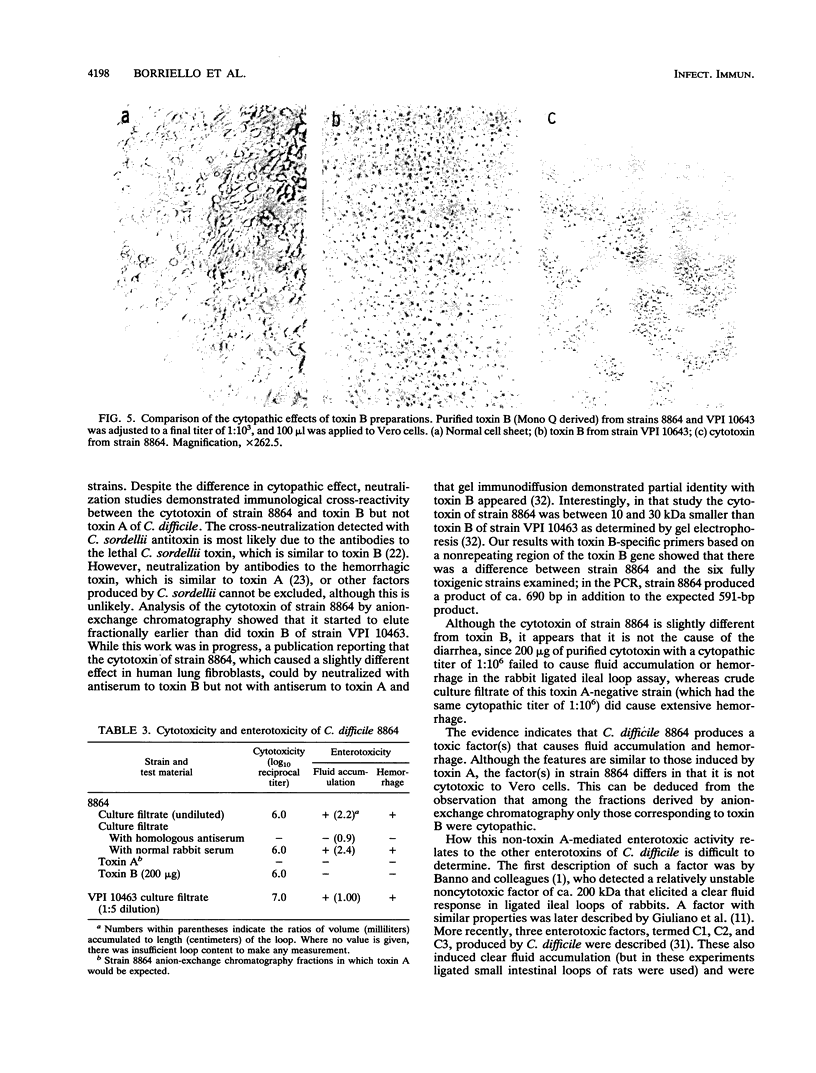
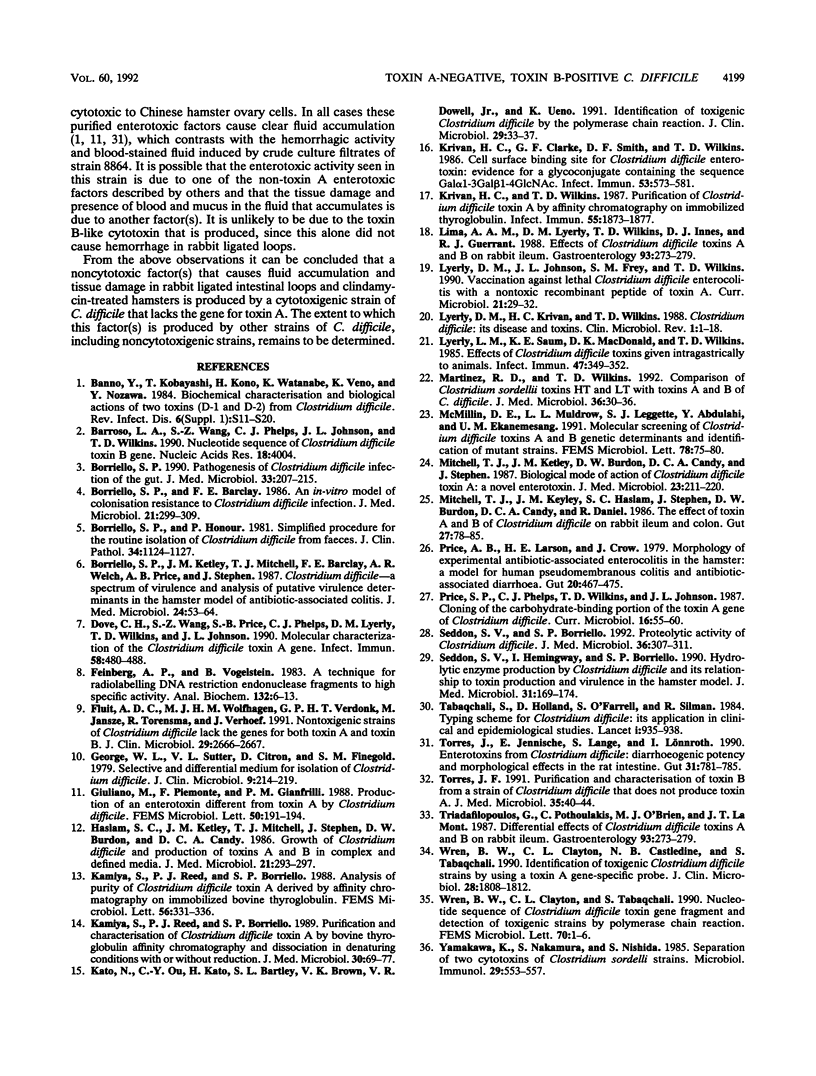
Images in this article
Selected References
These references are in PubMed. This may not be the complete list of references from this article.
- Banno Y., Kobayashi T., Kono H., Watanabe K., Ueno K., Nozawa Y. Biochemical characterization and biologic actions of two toxins (D-1 and D-2) from Clostridium difficile. Rev Infect Dis. 1984 Mar-Apr;6 (Suppl 1):S11–S20. doi: 10.1093/clinids/6.supplement_1.s11. [DOI] [PubMed] [Google Scholar]
- Barroso L. A., Wang S. Z., Phelps C. J., Johnson J. L., Wilkins T. D. Nucleotide sequence of Clostridium difficile toxin B gene. Nucleic Acids Res. 1990 Jul 11;18(13):4004–4004. doi: 10.1093/nar/18.13.4004. [DOI] [PMC free article] [PubMed] [Google Scholar]
- Borriello S. P. 12th C. L. Oakley lecture. Pathogenesis of Clostridium difficile infection of the gut. J Med Microbiol. 1990 Dec;33(4):207–215. doi: 10.1099/00222615-33-4-207. [DOI] [PubMed] [Google Scholar]
- Borriello S. P., Barclay F. E. An in-vitro model of colonisation resistance to Clostridium difficile infection. J Med Microbiol. 1986 Jun;21(4):299–309. doi: 10.1099/00222615-21-4-299. [DOI] [PubMed] [Google Scholar]
- Borriello S. P., Honour P. Simplified procedure for the routine isolation of Clostridium difficile from faeces. J Clin Pathol. 1981 Oct;34(10):1124–1127. doi: 10.1136/jcp.34.10.1124. [DOI] [PMC free article] [PubMed] [Google Scholar]
- Borriello S. P., Ketley J. M., Mitchell T. J., Barclay F. E., Welch A. R., Price A. B., Stephen J. Clostridium difficile--a spectrum of virulence and analysis of putative virulence determinants in the hamster model of antibiotic-associated colitis. J Med Microbiol. 1987 Aug;24(1):53–64. doi: 10.1099/00222615-24-1-53. [DOI] [PubMed] [Google Scholar]
- Dove C. H., Wang S. Z., Price S. B., Phelps C. J., Lyerly D. M., Wilkins T. D., Johnson J. L. Molecular characterization of the Clostridium difficile toxin A gene. Infect Immun. 1990 Feb;58(2):480–488. doi: 10.1128/iai.58.2.480-488.1990. [DOI] [PMC free article] [PubMed] [Google Scholar]
- Feinberg A. P., Vogelstein B. A technique for radiolabeling DNA restriction endonuclease fragments to high specific activity. Anal Biochem. 1983 Jul 1;132(1):6–13. doi: 10.1016/0003-2697(83)90418-9. [DOI] [PubMed] [Google Scholar]
- Fluit A. C., Wolfhagen M. J., Verdonk G. P., Jansze M., Torensma R., Verhoef J. Nontoxigenic strains of Clostridium difficile lack the genes for both toxin A and toxin B. J Clin Microbiol. 1991 Nov;29(11):2666–2667. doi: 10.1128/jcm.29.11.2666-2667.1991. [DOI] [PMC free article] [PubMed] [Google Scholar]
- George W. L., Sutter V. L., Citron D., Finegold S. M. Selective and differential medium for isolation of Clostridium difficile. J Clin Microbiol. 1979 Feb;9(2):214–219. doi: 10.1128/jcm.9.2.214-219.1979. [DOI] [PMC free article] [PubMed] [Google Scholar]
- Haslam S. C., Ketley J. M., Mitchell T. J., Stephen J., Burdon D. W., Candy D. C. Growth of Clostridium difficile and production of toxins A and B in complex and defined media. J Med Microbiol. 1986 Jun;21(4):293–297. doi: 10.1099/00222615-21-4-293. [DOI] [PubMed] [Google Scholar]
- Kamiya S., Reed P. J., Borriello S. P. Purification and characterisation of Clostridium difficile toxin A by bovine thyroglobulin affinity chromatography and dissociation in denaturing conditions with or without reduction. J Med Microbiol. 1989 Sep;30(1):69–77. doi: 10.1099/00222615-30-1-69. [DOI] [PubMed] [Google Scholar]
- Kato N., Ou C. Y., Kato H., Bartley S. L., Brown V. K., Dowell V. R., Jr, Ueno K. Identification of toxigenic Clostridium difficile by the polymerase chain reaction. J Clin Microbiol. 1991 Jan;29(1):33–37. doi: 10.1128/jcm.29.1.33-37.1991. [DOI] [PMC free article] [PubMed] [Google Scholar]
- Krivan H. C., Clark G. F., Smith D. F., Wilkins T. D. Cell surface binding site for Clostridium difficile enterotoxin: evidence for a glycoconjugate containing the sequence Gal alpha 1-3Gal beta 1-4GlcNAc. Infect Immun. 1986 Sep;53(3):573–581. doi: 10.1128/iai.53.3.573-581.1986. [DOI] [PMC free article] [PubMed] [Google Scholar]
- Krivan H. C., Wilkins T. D. Purification of Clostridium difficile toxin A by affinity chromatography on immobilized thyroglobulin. Infect Immun. 1987 Aug;55(8):1873–1877. doi: 10.1128/iai.55.8.1873-1877.1987. [DOI] [PMC free article] [PubMed] [Google Scholar]
- Lyerly D. M., Krivan H. C., Wilkins T. D. Clostridium difficile: its disease and toxins. Clin Microbiol Rev. 1988 Jan;1(1):1–18. doi: 10.1128/cmr.1.1.1. [DOI] [PMC free article] [PubMed] [Google Scholar]
- Lyerly D. M., Saum K. E., MacDonald D. K., Wilkins T. D. Effects of Clostridium difficile toxins given intragastrically to animals. Infect Immun. 1985 Feb;47(2):349–352. doi: 10.1128/iai.47.2.349-352.1985. [DOI] [PMC free article] [PubMed] [Google Scholar]
- Martinez R. D., Wilkins T. D. Comparison of Clostridium sordellii toxins HT and LT with toxins A and B of C. difficile. J Med Microbiol. 1992 Jan;36(1):30–36. doi: 10.1099/00222615-36-1-30. [DOI] [PubMed] [Google Scholar]
- McMillin D. E., Muldrow L. L., Leggette S. J., Abdulahi Y., Ekanemesang U. M. Molecular screening of Clostridium difficile toxins A and B genetic determinants and identification of mutant strains. FEMS Microbiol Lett. 1991 Feb;62(1):75–80. doi: 10.1016/0378-1097(91)90258-c. [DOI] [PubMed] [Google Scholar]
- Mitchell T. J., Ketley J. M., Burdon D. W., Candy D. C., Stephen J. Biological mode of action of Clostridium difficile toxin A: a novel enterotoxin. J Med Microbiol. 1987 May;23(3):211–219. doi: 10.1099/00222615-23-3-211. [DOI] [PubMed] [Google Scholar]
- Mitchell T. J., Ketley J. M., Haslam S. C., Stephen J., Burdon D. W., Candy D. C., Daniel R. Effect of toxin A and B of Clostridium difficile on rabbit ileum and colon. Gut. 1986 Jan;27(1):78–85. doi: 10.1136/gut.27.1.78. [DOI] [PMC free article] [PubMed] [Google Scholar]
- Price A. B., Larson H. E., Crow J. Morphology of experimental antibiotic-associated enterocolitis in the hamster: a model for human pseudomembranous colitis and antibiotic-associated diarrhoea. Gut. 1979 Jun;20(6):467–475. doi: 10.1136/gut.20.6.467. [DOI] [PMC free article] [PubMed] [Google Scholar]
- Seddon S. V., Borriello S. P. Proteolytic activity of Clostridium difficile. J Med Microbiol. 1992 May;36(5):307–311. doi: 10.1099/00222615-36-5-307. [DOI] [PubMed] [Google Scholar]
- Seddon S. V., Hemingway I., Borriello S. P. Hydrolytic enzyme production by Clostridium difficile and its relationship to toxin production and virulence in the hamster model. J Med Microbiol. 1990 Mar;31(3):169–174. doi: 10.1099/00222615-31-3-169. [DOI] [PubMed] [Google Scholar]
- Tabaqchali S., Holland D., O'Farrell S., Silman R. Typing scheme for Clostridium difficile: its application in clinical and epidemiological studies. Lancet. 1984 Apr 28;1(8383):935–938. doi: 10.1016/s0140-6736(84)92392-4. [DOI] [PubMed] [Google Scholar]
- Torres J. F. Purification and characterisation of toxin B from a strain of Clostridium difficile that does not produce toxin A. J Med Microbiol. 1991 Jul;35(1):40–44. doi: 10.1099/00222615-35-1-40. [DOI] [PubMed] [Google Scholar]
- Torres J., Jennische E., Lange S., Lönnroth I. Enterotoxins from Clostridium difficile; diarrhoeogenic potency and morphological effects in the rat intestine. Gut. 1990 Jul;31(7):781–785. doi: 10.1136/gut.31.7.781. [DOI] [PMC free article] [PubMed] [Google Scholar]
- Triadafilopoulos G., Pothoulakis C., O'Brien M. J., LaMont J. T. Differential effects of Clostridium difficile toxins A and B on rabbit ileum. Gastroenterology. 1987 Aug;93(2):273–279. doi: 10.1016/0016-5085(87)91014-6. [DOI] [PubMed] [Google Scholar]
- Wren B. W., Clayton C. L., Castledine N. B., Tabaqchali S. Identification of toxigenic Clostridium difficile strains by using a toxin A gene-specific probe. J Clin Microbiol. 1990 Aug;28(8):1808–1812. doi: 10.1128/jcm.28.8.1808-1812.1990. [DOI] [PMC free article] [PubMed] [Google Scholar]
- Wren B. W., Clayton C. L., Tabaqchali S. Nucleotide sequence of Clostridium difficile toxin A gene fragment and detection of toxigenic strains by polymerase chain reaction. FEMS Microbiol Lett. 1990 Jun 15;58(1):1–6. doi: 10.1016/0378-1097(90)90092-5. [DOI] [PubMed] [Google Scholar]
- Yamakawa K., Nakamura S., Nishida S. Separation of two cytotoxins of Clostridium sordellii strains. Microbiol Immunol. 1985;29(6):553–557. doi: 10.1111/j.1348-0421.1985.tb00857.x. [DOI] [PubMed] [Google Scholar]





